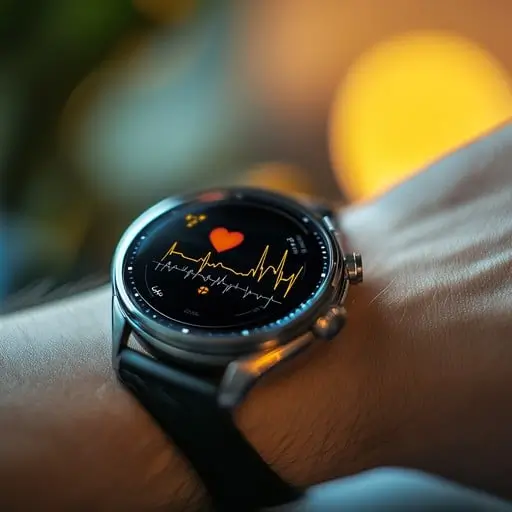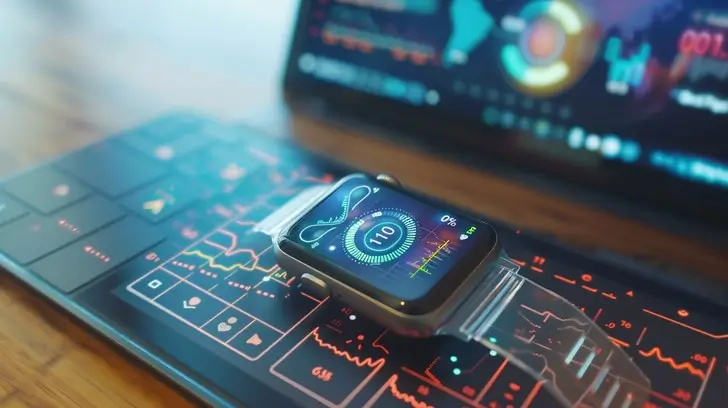
Table of Contents
1. What Is a Wearable Blood Pressure Monitor?
A wearable blood pressure monitor is a compact, portable health device designed to measure your blood pressure anytime, anywhere. Unlike traditional arm cuffs, wearable BP monitors—especially wrist-based designs—focus on convenience, comfort, and real-time readings that help users track their cardiovascular health daily.
These modern devices are becoming essential for people with hypertension, athletes, seniors, caregivers, and anyone who wants easy, continuous monitoring.
While wearable blood pressure monitors are designed for home use, they should not replace professional medical devices. For people with heart conditions or hypertension, it’s recommended to consult a healthcare provider before relying on wearable readings.
Many modern blood pressure wearables now integrate with non-invasive wearable diabetes monitoring technologies, creating a more complete picture of metabolic and cardiovascular health.
2. How Accurate Is a Wearable Blood Pressure Monitor?
Wearable BP monitors typically rely on:
✔ Oscillometric measurement
The same method used in medical-grade BP devices.
✔ Wrist-based sensors
Measure pressure in radial arteries.
✔ Smart Algorithms
Improve reading accuracy using motion detection and heart-rhythm analysis.
3. Benefits of Using a Wearable Blood Pressure Monitor
✔ Portability
Small, lightweight, and easy to carry.
✔ Fast readings
Most wearable BP devices provide measurements in 30–40 seconds.
✔ Ideal for seniors
Large screens, voice prompts, and easy operation.
✔ Helps track hypertension trends
Multiple readings stored for long-term insights.
✔ Perfect for daily health monitoring
Especially for people in stressful or high-activity environments.
👉 Want a reliable wearable blood pressure monitor for daily home tracking?
See the most accurate and best-reviewed options available on Amazon.
4. Accuracy: Are Wearable BP Monitors Reliable?
Wrist-based monitors can be accurate if used correctly.
Accuracy depends on: (KardiaMobile 6-lead EKG review)
- Wrist position (must be at heart level)
- Cuff fit and tightness
- Body posture
- Device quality
Wearable BP devices like the Oklar monitor use enhanced oscillometric algorithms and LED backlit displays to reduce human error.
Tip: Always take 2–3 readings and average them for the most reliable results. (ECG wearable devices)
5. Best Wearable Blood Pressure Monitor Alternatives (2026)
If you want a fast, accurate, and portable wearable blood pressure monitor, the Oklar Wrist Blood Pressure Monitor is one of the best choices available in 2026.
Omron HeartGuide – Most Accurate Wearable Option
Omron is one of the most trusted medical brands in blood pressure monitoring.
Why it stands out:
- Clinically validated
- Inflatable cuff inside the watch
- FDA-cleared
- Trusted by doctors
⚠️ Cons:
- Expensive
- Bulky design
👉 Check Omron HeartGuide on Amazon
Oklar Rechargeable Wrist Blood Pressure Monitor (Best Budget)
If you want daily tracking at home, this is a strong and affordable option.
Why people buy it:
- Large LED display
- Voice broadcast (great for seniors)
- Memory for 2 users
- Rechargeable (no batteries)
👉 View Oklar Wrist BP Monitor on Amazon
Samsung Galaxy Watch (Trend Tracking Only)
⚠️ Not a medical device in most countries
Good for:
- BP trends (with calibration)
- Heart rate & ECG
- Fitness + lifestyle users
👉 Check Galaxy Watch BP Features on Amazon
Best Wearable Blood Pressure Monitors (Wrist vs Arm)
Omron HeartGuide (Best Overall)
- FDA-cleared wearable BP monitor
- Clinical-level accuracy
- Ideal for daily home monitoring
👉 Best for: Users who want medical-grade accuracy
Check Omron HeartGuide on Amazon
Oklar Rechargeable Wrist BP Monitor (Best Budget)
- Wrist-based & portable
- Voice broadcast + memory storage
- Easy for seniors
👉 Best for: Budget buyers & elderly users
See Oklar BP Monitor on Amazon
Fitbit / Samsung (Alternative – Not Medical)
- Track trends, not clinical BP
- Useful for lifestyle awareness
👉 Important: Not a replacement for medical BP devices
Wearable blood pressure monitors are designed for home tracking and trend monitoring. For diagnosis or treatment decisions, always consult a healthcare professional. FDA-cleared devices like Omron offer the highest reliability.
| Device | Medical Accuracy | Wearable | Best For |
|---|---|---|---|
| Omron HeartGuide | ✅ High | ✅ Yes | Medical tracking |
| Oklar Wrist Monitor | ✅ Good | ❌ No | Home BP checks |
| Galaxy Watch | ⚠️ Trend-based | ✅ Yes | Daily monitoring |
Oklar Rechargeable Wrist Blood Pressure Monitor — Full Review
Key Features
1. Dual User Mode (240 Memory Storage)
Perfect for couples or caregivers.
Each user gets 120 reading slots—very useful for detecting patterns over time.
2. Fast & Accurate Readings
Takes just 35 seconds to measure BP with a single button.
Includes automatic shut-off after 60 seconds.
3. Voice Broadcast Function
Ideal for seniors or anyone with low vision.
Adjustable volume + option to disable.
4. LED Backlit Display
Huge bright screen makes numbers easy to read in daylight or darkness.
5. Rechargeable Battery
No more spending on AAA batteries.
Comes with USB Type-C charging cable.
6. Adjustable Wrist Cuff
Fits wrists 4.92–8.46 inches, ensuring accurate and comfortable readings.

Why It’s a Top Choice for Wearable BP Monitoring
Portable and truly wearable
Perfect for travel, work, home use
Affordable alternative to smartwatches with limited BP accuracy
Designed for seniors, adults, and caregivers
Highly rated for usability and comfort
Recommended Usage
Take measurements at the same time daily
Hold your wrist at heart level
Rest for 5 minutes before measuring
6. How to Use a Wrist BP Monitor Correctly
To maximize accuracy:
Sit upright with back supported
Keep feet flat on the floor
Raise your wrist to heart level
Avoid movement and talking during measurement
7. Pros & Cons of Wearable BP Devices
Pros
- Extremely portable
- Easy to use
- Great for seniors
- Fast measurements
- Memory tracking
Cons
- More sensitive to positioning
- Not as accurate as upper-arm medical devices (in some cases)
8. Who Should Use a Wearable Blood Pressure Monitor?
Ideal for:
- Hypertensive patients
- Seniors
- Athletes tracking cardiovascular stress
- Caregivers
- People in high-stress jobs
- Anyone needing portable BP monitoring
👉 health tracking devices for home use
👉 home health monitoring devices
Sources
American Heart Association — Blood Pressure Guidelines
NIH — Wearable Medical Devices Research
FAQ
1. Are wearable blood pressure monitors accurate?
Yes, they can be accurate when used properly at heart level and with the correct cuff fit.
2. Is a wrist BP monitor better than an arm monitor?
Wrist monitors are more portable, while arm monitors can be more clinically accurate.
3. Does the Oklar wrist monitor work for seniors?
Yes — the large LED screen + voice broadcast makes it ideal for seniors.
4. How often should I measure my BP?
Once in the morning and once in the evening, unless your doctor recommends otherwise.

Pingback: ECG Wearable Devices in 2026: Smart Heart Monitoring Guide
Pingback: Top Wearables for Seniors: Fitness & Smart Health Tech
Pingback: Best Non-Invasive Wearable Diabetes Monitors (2026): Glucose Tracking Without Needles
Pingback: Wearable Sleep Technology 2026: How Smart Devices Improve Sleep, Health & Recovery
Pingback: Medical Grade Wearables: How Accurate Are FDA-Cleared Health Devices in 2026?